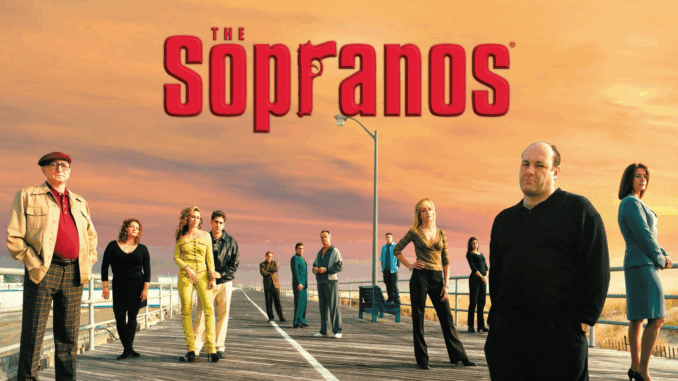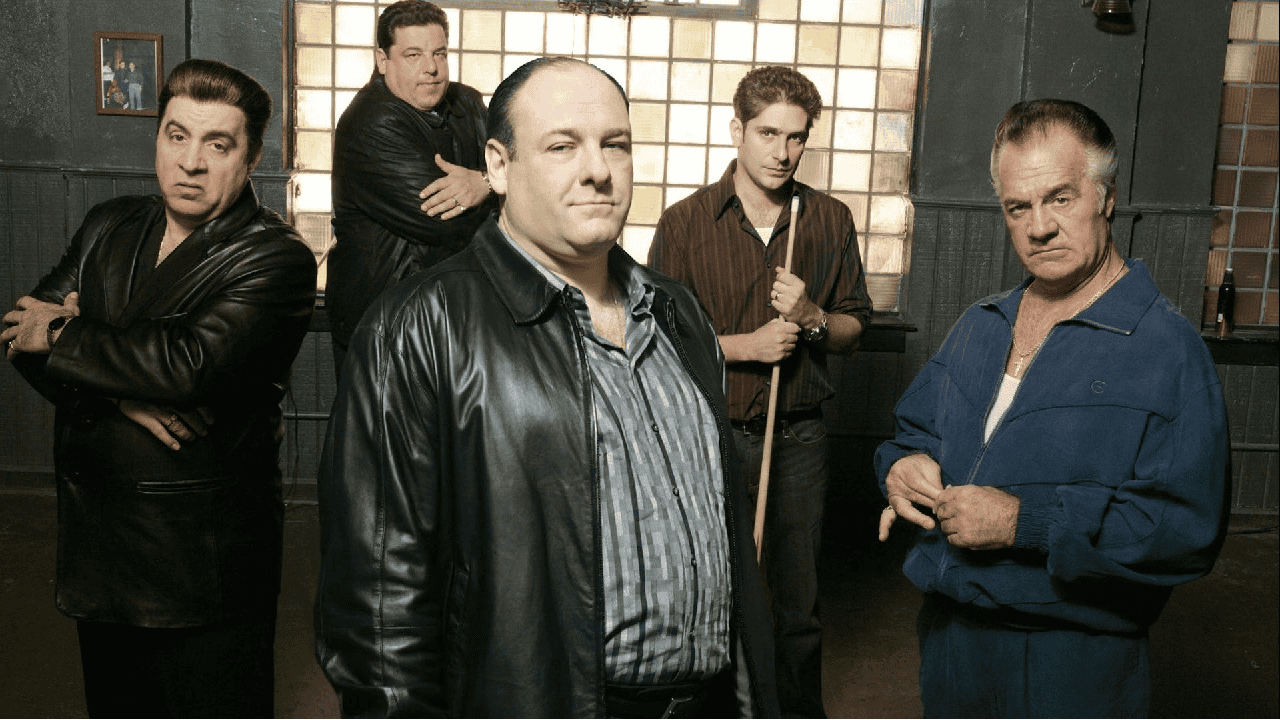
If Season 2 of The Sopranos broke our hearts, Season 3 shatters illusions. No longer content with simply showing the consequences of betrayal or the pressure of mob life, this season dives into the existential cost of power. It’s darker, colder, and more haunting. In Season 3, the emotional armor of every character begins to crack. Tony Soprano isn’t just the boss — he’s a man carrying an unrelenting weight: of leadership, of family expectations, and of guilt he can’t admit.
This is the season where the series shifts from brilliant television to a cultural and philosophical landmark.
The Sopranos in a Post-Pussy World
The ghost of Sal “Big Pussy” Bonpensiero looms large over Season 3. While he may be physically gone, Tony can’t shake his presence — literally. He dreams of Pussy as a talking fish in Season 2, and here, that unresolved guilt continues to rot his soul.
Tony’s trust in others becomes increasingly fractured. His paranoia escalates. The burden of leadership becomes more than just strategy and survival — it becomes spiritual corrosion. Killing Pussy was a line crossed, and the further Tony walks, the harder it is to turn back.
This sets the tone for a season that constantly asks: What is the cost of staying in control?
Jackie Jr. and the Illusion of Inheritance
One of the standout arcs in Season 3 is that of Jackie Aprile Jr., the son of Tony’s deceased friend and former boss, Jackie Aprile Sr. Jackie Jr. is dating Meadow, Tony’s daughter, and is being watched closely by everyone in the mob world. There’s hope that maybe — maybe — this kid could go legit, that he might escape the violent fate of the men before him.
But Jackie Jr. idolizes the wrong things. He sees mob life through the lens of The Godfather, not reality. He romanticizes power and tries to prove himself by pulling a low-rent heist, thinking it’ll earn him respect. Instead, it seals his fate.
Jackie Jr. is a tragic figure, not because he’s evil or even particularly ambitious, but because he’s naïve. He tries to emulate a version of Tony that never truly existed. In doing so, he drags Meadow into his descent and forces Tony into the terrible role of executioner once again — indirectly, this time.
When Jackie is murdered, Meadow doesn’t know for sure that her father was behind it. But we do. And so does Tony. The guilt festers.
Meadow and A.J.: Disillusionment and Coming of Age
Meadow Soprano continues to grow into a sharp, morally inquisitive young woman. Her relationship with Jackie Jr. reveals a lot about her internal conflict. She loves him, but senses — even before the rest of the family does — that he’s flawed and possibly dangerous. After his death, Meadow becomes increasingly disillusioned with her family.
She may not say it, but the slow realization is there: she knows what her father is.
A.J., on the other hand, still lives in ignorance. He’s maturing, but slowly. He begins to dabble in rebellion — skipping school, questioning religion — but he’s still cocooned in the privilege and denial that come with being Tony Soprano’s son. There’s a particularly poignant moment when he’s tasked with writing a paper on existentialism and chooses to plagiarize. A perfect metaphor for the kid who refuses to confront reality.

Tony and Gloria Trillo: Lust, Rage, and Projection
Season 3 features one of the most intense subplots in the entire series: Tony’s affair with Gloria Trillo, a fellow patient at Dr. Melfi’s practice. Gloria isn’t just another goomar — she’s emotionally volatile, intelligent, and dangerously similar to Livia Soprano.
Their relationship is a psychological minefield. Gloria draws Tony in with her wit and sensuality, but she’s also unstable, manipulative, and increasingly suicidal. Tony is both attracted to and repelled by her. The tragedy is that Gloria reminds him of his mother — and instead of running from that, he’s subconsciously drawn toward it.
Eventually, their relationship devolves into violence and toxic accusations. Gloria’s emotional demands trigger Tony’s deepest rage. In a chilling moment, he comes close to murdering her in a fit of fury — only stopping short, perhaps, because of the faint echo of Melfi’s influence.
Their final interaction — when Tony sends a mob enforcer to threaten her to stay away — marks another personal failing. He can’t solve emotional problems without resorting to fear.
Carmela: Awareness Without Escape
Carmela’s emotional arc in Season 3 is marked by increasing clarity — and mounting helplessness. She knows Tony is cheating. She knows he’s responsible for brutal crimes. She knows, deep down, that her lifestyle is soaked in blood.
And yet she stays.
Her faith becomes both a refuge and a prison. In the standout episode “Second Opinion,” Carmela seeks counsel from a priest and a female psychiatrist. She wants permission to hope, to believe that her suffering has purpose. But the answers she gets are either hollow or condemnatory. She’s told she’s morally complicit — and she knows it.
This is the tragedy of Carmela: she’s awake, but paralyzed. She’s aware of the poison, but too embedded to escape.
“Employee of the Month” — A Turning Point for Melfi
Arguably one of the most gut-wrenching episodes in the entire series, “Employee of the Month” places Dr. Melfi at the center. After being violently raped in a parking garage, she faces the shattering question: should she tell Tony and let him handle it his way?
We, the audience, know what that means — swift, brutal vengeance. And for a moment, Melfi wants it. She’s tempted. The scene where she imagines Tony learning about the attack and taking revenge is both cathartic and terrifying.
But she doesn’t tell him.
This choice is pivotal. Melfi asserts moral independence, even if it means living with injustice. It’s a harrowing reminder of the line she refuses to cross — a line that Tony, and the world he lives in, crossed long ago.
Ralph Cifaretto: A New Breed of Monster
Introduced mid-season, Ralph Cifaretto (Joe Pantoliano) is one of the most polarizing characters in The Sopranos. He’s funny, charismatic, and absolutely repulsive. His behavior is erratic and cruel, especially in “University,” an episode that draws brutal parallels between Meadow’s college life and the tragic murder of a young stripper named Tracee.
Ralph’s callousness — laughing off Tracee’s death after beating her to death outside the Bing — draws a rare burst of violence from Tony, who nearly kills him. But Tony doesn’t kill Ralph, because Ralph earns too much money.
That decision says everything.
In Season 3, we begin to understand that morality is subordinate to economics. The cost of power isn’t just guilt — it’s silence. Compromise. Allowing monsters to thrive if they serve the bottom line.
Tony’s Guilt, Grief, and Gradual Unraveling
Throughout Season 3, we see Tony become increasingly reflective. He talks about legacy. He questions who he’s becoming. But he also doubles down on cruelty when necessary. He shuts off the vulnerable parts of himself — the ones exposed by therapy, love, and guilt — and leans into domination.
Still, the cracks show. In “Pine Barrens,” one of the series’ most famous episodes, a botched murder attempt becomes a slapstick nightmare. It’s funny on the surface — Paulie and Christopher lost in the snow, bickering like children — but underneath is the message: these people are not in control. The mob is chaos disguised as hierarchy.
Legacy of Season 3
Season 3 is arguably the most emotionally dense season of The Sopranos. It doesn’t rely on shock deaths or explosive reveals. Instead, it methodically tears away the characters’ justifications, illusions, and masks.
By the end, Tony Soprano is still the boss. But he’s more haunted than ever. He’s lost another piece of his soul. Carmela is drowning in quiet despair. Meadow sees the truth more clearly. And the world around them — full of grifters, liars, and broken people — feels more like a cage than ever.
Power has been won. But the cost? Everything.
